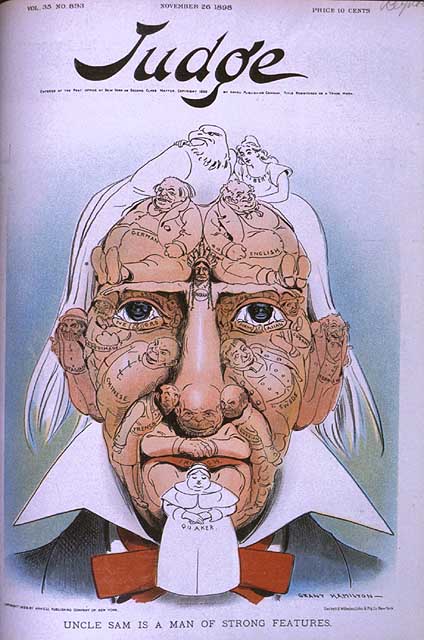The Immigrant Experience: Eng 3165/AmSt 3304
Brooklyn College, Fall 2015
Uncle Sam - Strong Features

"Uncle Sam is a Man of Strong Features" (1898)
Monday, December 12, 2011
questions for shteyengart's 'mother tongue'
Tuesday, December 6, 2011
Discussion questions for "Joebell and America"
Questions for Who's Irish?
1. How does the story being told from the perspective of the grandmother impact your view on who is in the right and who is in the wrong in this situation? Does it make you empathize more with the grandmother?
2. This story presents the issue of the cultural gap that exists within an interracial family, but also presents the issue of the generational gap that exists among many parents and their children, regardless of race. Both are deep-rooted in a lack of communication. Which do you think is easier to triumph?
3. How is it that by the end of the story, John’s brothers are miserable living with their mother, John is depressed without a job, and Natalie is exhausted with nobody to turn to? Do you think the author was trying to prove anything by ending the story with Bess and Sophie’s grandmother as the only two people happy?
4. The grandmother’s parenting style is reminiscent of Amy Chua’s, better known as the “Tiger Mom” who caused controversy earlier in the year, when she wrote a piece for the WSJ titled “Why Chinese Moms are Superior”, revealing the practices of some Chinese parents who raised stereotypically “successful” kids. Both parenting styles are based on strict child rearing to achieve the specific goal at hand. Ultimately, they get their children to achieve the goal, but they completely disregard the child’s self-esteem. Does the effectiveness of this approach make it acceptable? Link to article: http://online.wsj.com/article/SB10001424052748704111504576059713528698754.html
5. Deciding which parenting techniques work best for your family is a challenge. Naturally, a parent turns to his or her own experiences as a child to decide what techniques worked well and what techniques didn’t work well, just as Natalie did. Natalie and her mother turned out to have opposing views, as is the case among most parents and their children. Did Natalie cross the line of disrespect by kicking her mother out of her house, or was her defending of her family admirable?
Thursday, December 1, 2011
Discussion Questions for The Dew Breaker
1. Why do you think the preacher keeps referring to his wife's death with such great detail, in sermon and in thought?
2. Anne is upset with the preacher for spending all of his time talking about the government and trying to turn people against them. She then explains how he walked out on his own family, Why do you think he devoted his time away from his family and instead, to activism?
3. On page 216, Rosalie is introduced. Do you find it strange that a government as corrupt and oppressive as this allows women to hold any kind of superior rank, let alone any rank, in the Volunteers?
4. Had the preacher not attacked the fat man with the splintered leg of the chair, do you think he would have been released from the jail?
5. What kind of political statement do you think Danticat is trying to make in writing this novel?
Tuesday, November 29, 2011
Response Questions for dew breaker
1- Directly from the start of the book, Danticat introduces several themes to the reader. What are some of those themes?
2-Do you think it would make a difference if the story is told differently from one point of view? How does the many viewpoints affect the story?
3-How are the characters in the story similar or different? Do you see any connections between any of them with Ka or her dad thus far?
4-Do you think Danticat is trying to indirectly imply something with the inter-related story lines?
5-Why do you suppose the author tells the story from different point of views?
Monday, November 28, 2011
Discussion Questions for The Dew Breaker
3)"'Isn't it amazing? Jackie Kennedy can go to Haiti anytime she wants but we can't," (pg.179) What does this statement imply in regards to the political and cultural aspects of Haitian culture during this time?
4) What could have been some of the "political" factors that may have caused Monsieur to Christophe to not recognize Michel as his son?
5) What does Romain mean when he says that the president used to be a short tailed monkey, but is now a long tailed one? Why does he think this?
Saturday, November 26, 2011
Discussion Questions to The Dew Breaker
2. Do you think the portrayal of the characters, particularly the seamtress, living with terror and having it never go away is the case with all of the immigrants who have experienced this?
3. Aline thinks that she "had never imagined that people like Beatice existed, men and women whose tremendous agonies filled every blank space in their lives" (137). Is the way that Aline thinks of these men and women in this passage similar to how Danticat raises up the other characters in the novel?
4. Beatice, the seamtress, tries to reinvent herself by forgetting her haunting past. Do you think she is successful in doing so or has she failed?
5. Do you think that most of the characters unconsciously or voluntarily create a tiny piece from Haiti to incorporate into their lives in America?
6. Why does Beatrice live close to the prison guard knowing that he tortured her back in Haiti? How does Beatrice's experience add to the novel?